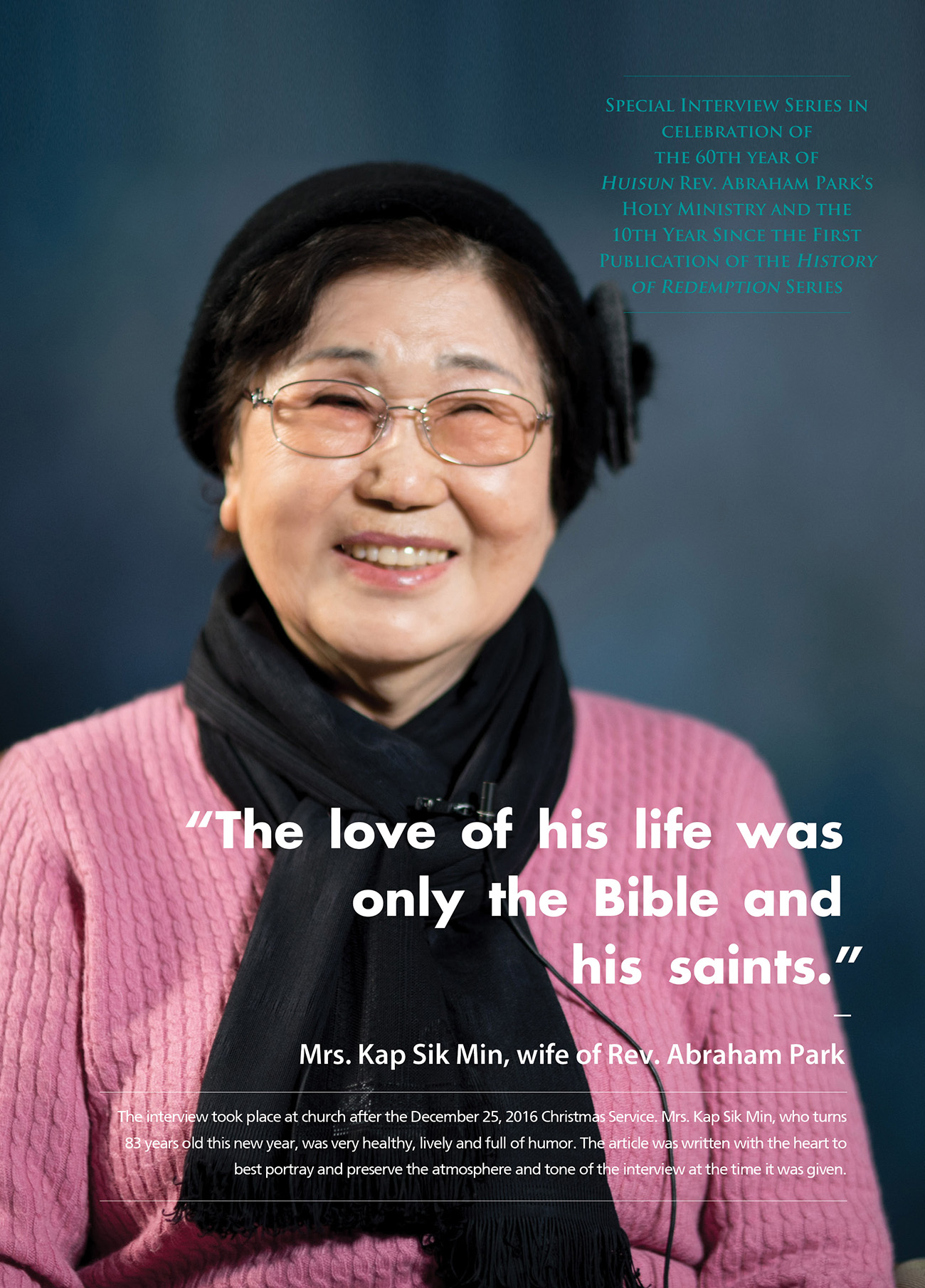
"The love of his life was only the Bible and his saints"
Mrs. Kap Sik Min, wife of Rev. Abraham Park
The interview took place at the church after the December 25, 2016 Christmas Service. Mrs. Kap Sik Min, who turns 83 years old this new year, was very healthy, lively and full of humor. The article was written with the heart to best portray and preserve the atmosphere and tone of the interview at the time it was given.
In all ages and countries, numerous men in power have had to face a terrible end because of their families or closest associates. There is no need to mention former presidents. This is also very common in Christian circles in Korea. Numerous churches have faced dissension because wives of pastors had seized authority hidden from the eyes of others. Rev. Abraham Park always said, “The pastors of our church do not even know what my wife looks like.” Because he kept his spouse and three sons from handling matters of the church, Pyungkang Cheil Church developed into a healthy community of faith with little noise from the founding pastor’s family. Not only that, Rev. Abraham Park always lived a life of the Word and of prayer, considering the church as his home and the congregation as his family. While the congregation continued to grow through this father-like pastor, the family members of the founding pastor made their sacrifices in silence. Without their years of enduring hardships, Rev. Abraham Park’s great ministry could not have existed, nor would Pyungkang Cheil Church and its congregation exist today.
For this year of 2017, in celebration of the 60th year of Huisun Rev. Abraham Park’s holy ministry and the 10th year since the first publication of the History of Redemption series, True Peace Magazine has planned a special interview series in collaboration with the Huisun Memorial Foundation and PCN (the Pyungkang Christian Network), starting with the wife of Rev. Abraham Park, Mrs. Kap Sik Min.
The following interview is a continuation of the preview from last month’s publication, presented in its entirety.
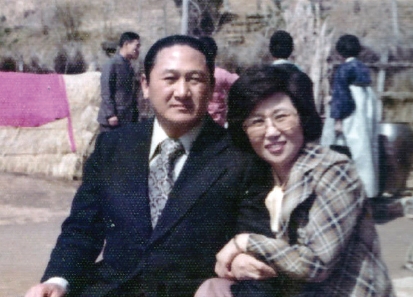
Today is the day the Word became flesh and came down to earth. It’s no coincidence that this interview of the well-respected wife of Rev. Abraham Park is taking place on such a meaningful day. First off, please tell us when and where you were born.
I was born in the village of Sinseong, in the town of Hapdeok in the city of Dangjin, in South Chungcheong Province. In the lunar calendar it was October 4, 1934, but family records say April 2, 1935. I’m the ninth out of ten children. I have five brothers, three older sisters, and one younger sister.
What a large family. Why were there so many children?
Ask my mother. [Laughs]
What did your father do for a living?
My family is from the Yeoheung Min clan. It was a large family even in our town. My grandfather and his four brothers held government positions and lived in big houses side-by-side in the neighborhood. I grew up very modestly, scolded for the tiniest mistakes. My father was saturated in the customs of noblemen, to the point he would pick his teeth even after drinking cold water. He studied agriculture and was a leader in the farm villages. We were rich before the liberation, but then my brothers were drafted into the Japanese army, and my father had a stroke from all the stress. He wanted to do something after the liberation, but he couldn’t. He died after being bedridden for 13 years.
You must have been around 10 years old.
I believe I was around nine or ten.
What memory do you have of your father?
I only saw him suffer from the Japanese during the colonial rule. After that, I only saw him sick in bed.
Did your parents go to church?
My mother went to a Catholic church and would sometimes tag along. My father didn’t. The Catholic churches were all so far away in the countryside. My family members were not fervent believers. There were times my mother couldn’t go when she was too busy taking care of her many children.
How long did you live there?
My brothers were all gone and my father ended up like that, and my mother didn’t know how to do anything because she had never dealt with outside work. So we sold our rice paddy and eventually our house. Things were tough, so once my brothers returned after the liberation we moved to Yesan. I believe we were liberated when I was 12 years old and moved to Yesan when I was 13. I lived in Yesan up until I was 19 or 20 and then moved to Yangnam-dong, Seoul.
What did you do in Seoul?
I lived at my brother’s place. My oldest sister lived in Gocheok-dong. I didn’t work. But I did go to church.
So you’ve been going to church since then. Which church did you go to?
There was a church named Saemaeul Church in Yeongdeungpo. It seems like it’s no longer there. It was to the left when walking to the Yeongdeungpo market from Yangnam-dong.
Did someone invite you to the church?
Someone must have evangelized because I went, right? [Laughs]
Was there a special reason?
I grew up very strictly. Although my brother was also strict too, I had more freedom living separately from my parents. So back then, I chose to go to church to keep myself *disciplined.
*The original word she used in the interview was 구속 (拘束), which means “restraint,” and also “redemptive history.”
I see there’s a double meaning. A restriction for redemptive history and also a restriction to oneself.
Yes. I chose to live this life of faith myself.
So when and where did you meet Rev. Park?
I met him through matchmaking at that time.
How old were you?
22.
So this was soon after you came to Seoul.
Yes. I went to Saemaeul Church for three years after coming to Seoul. An eldress from there arranged the match, speaking of a young man with great faith, and to try meeting him.
Where did you meet him?
I don’t remember, but at that time it must have been a coffee shop at the most.
What was your first impression of him?
He looked sharp (well-groomed) and seemed intelligent.
What did you talk about?
I don’t remember. How can I remember all that? It’s been 60 years. [Laughs]. It seemed like there would be enough to live on since he looked smart. I met him because he was intelligent. My family strongly opposed, but we got married.
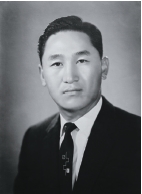
That would have been around 1956.
Yes, I got married in 1957. I had John (first son) in 1958. I came to Seoul and married a person who had nothing. He really had nothing.
Why did your family oppose?
Because he was from the North, and we don’t know what he did or how he lived up there. But I liked the fact that he was alone. Back then, we had to prepare clothes and many other things in order to get married to a nobleman, but my family was in no situation to do that, so I came up to Seoul thinking, “I cannot get married like that.”
Was that after Rev. Park was discharged from the army?
Yes. But even then, he went around to mountains and other places for his faith. We didn’t even date. He only went around praying. He was someone who prayed a lot, so I believed even if I had to be alone.
Where did you get married?
At the countryside.
So you went to your parent’s place in Yesan for the wedding. Was it a traditional wedding?
No, it was modern. The pastor of the church in town wasn’t available so the elder officiated the wedding. Since my groom attended church we couldn’t get married in a Catholic church, so we kept it simple and had service at home. We weren’t in any kind of circumstance to even have rings.
What about your honeymoon?
What honeymoon? How could I ask my family, who had close to nothing even after selling all their rice, to send me on a honeymoon? We stayed in the countryside for a couple days before returning to Seoul. That was my honeymoon.
How was your newly-married life?
He just went around to pray without establishing a home. He mostly lived in the mountains. Later on he would say, “I just came back from this mountain,” and that would be it. When I had my son John, I lost contact from him and didn’t even know which mountain he was at.
He didn’t write any letters?
Goodness, what letters?
He would just come then leave again.
For now, he left again. [Laughs]
It must have been hard to trust him, according to standards of the people in this world.
It was very difficult, for both me and my son John. But what could we do? I brought my mother over and left my baby with her so I could work. I got a job at this place called Dongyang Industries, earned my living there and raised my child. But even though we had nothing, I liked him because he was faithful and because he didn’t have anyone. Why? Because if he had parents who supported us with money, I might have had to live like a housemaid, like all the other housewives at that time. At least I didn’t have to live like that.
What was he like at home?
He just sat at his desk and read. He didn’t go to places with the family. He was only into his books and prayer. The moment he woke up he would be reading the Bible at his desk. That was his work. He must have done all that knowing he’d become a pastor.
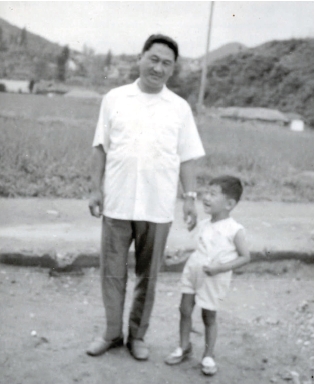
You must have thought he was a special man, even as his wife.
I did. Who would believe Jesus to the extent he did? How can I say anything to someone who believes with that much fervor?
You must have been very devout during that time too.
I must have been. Usually when you first begin to believe, your faith burns the hottest. I must have believed well to be understanding of all that, right? [Laughs]
Did you ever complain or argue?
No. That period wasn’t very long. Shortly afterwards he went to Dongmasan Church.
That was after you had your first son.
That’s right. When he was a year old. He ministered in Dongmasan Church and we registered our marriage, and had the children registered, and lived there about three years. We lived there until we had our second child, David.
What charm did he have as a man?
Charm? Goodness, what charm? What charm would a man who only reads the Bible have?
For starters, he was handsome.
Sure, and cool too. [Laughs]
Was he a smooth talker?
Of course he spoke well... [Laughs]
Did he ever say, “I’ll make sure you don’t worry about a living”?
He did say, “Although it’s tough now, I’ll make sure you live well later.” But it’s not like he went to do manual labor or go sell things to bring money…
What did he see in you to decide to marry you?
I don’t know.
Did he ever mention anything, like, “I married you because of this”?
Well, I heard from the matchmaker that he said he thought an angel was walking in. So he must have thought well of me. He must have thought I was well-mannered.
Did you have a calm, angel-like personality at the time?
I must have, at that time. [Laughs]. I received aristocrat lessons while growing up. Imagine how stern my father must have been, saying he would marry me off to a noble family. I think I was able to live with a pastor because I grew up like that.
Since when did Rev. Park say that he started to study the Bible and pray like that?
The only thing I heard was that he was like that even when he was in the army. So he was born like that. You can’t do something like that even if you’re forced to.
There wouldn’t be anyone like him, right?
Exactly.
Did he ever talk about his childhood or his life before he defected from the North?
He never talked about it.
Life was difficult even when he ministered in Dongmasan Church, right?
I think he received about 3,000 to 5,000 Won at the time. It was really difficult. We could live off of that for one month if we lived frugally. But he was never swayed by poverty or things like that. He stayed at church and would go somewhere all day. If I asked where he went, he would say that he went up to the mountains to pray. He said he prayed where Rev. Ki Cheul Choo had prayed.
How was the way he treated the saints?
Of course it was good.
Did he treat them with the heart of a parent?
Of course. It was in the countryside and everyone was poor, but we lived happily and had fun, all of us.
With affection.
Yes. But that wasn’t his goal. He couldn’t be in that small place forever.
That must have been when he went to Mount Jangan and Mount Jiri to pray.
I thought he lived in the mountains from the beginning. Then he stayed in the mountains for a very long time. That’s when he prayed in Mount Jiri and Mount Jangan.
Did you go to the prayer sites in Mount Jiri and Mount Jangan later?
I went to Mount Jangan three times and Mount Jiri once.
I think it must have felt different for you.
I remember thinking, “So he prayed at a place like this... he must have suffered a lot.” Think about it. All alone, in that frightful place. If it was me, I would have passed out and died after the first night. [Laughs]. In that deep mountain…
We know that he prayed in Mount Jangan and Mount Jiri for a long time, but for you, he was someone who lived in the mountains from the beginning.
Yes. Even while he was ministering, at times he would disappear at dawn. That was when he would evangelize on the streets. One of the elders said that he went out with my husband to beat the drums and evangelize on the streets. They would play the drums together. That’s how they evangelized back then.
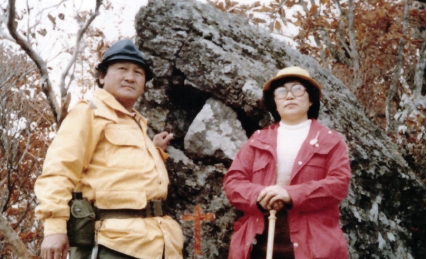
That must have been the time he said he evangelized on the streets like a one-man-band merchant. There are saints who saw him during that time.
You think he would’ve had that instrument? Just played the drums and evangelized like that.
Did he start with families without a church to minister when he came to Seoul?
After that we came to Seoul, blindly. It started with evangelizing one or two people, gathering and wor- shipping within families. The people we met at that time are people like Geuk Hwa Chun, Sun Ah Um, Jung Hwa Kim, and Eldress In Ae Lee.
How did they find out and start coming?
I think it started with meeting them, one by one, in prayer houses like Mount Samgak, and they invited him to teach at their homes because the message was so good. We first got a room in Sosa, then a little house in Yangnam-dong where the houses were the cheapest and lived there with the evangelists. There were many family members but no income, so we had to sell that house and move to Suwon. That’s where my third son was born, in 1965. There was no church even when Joseph was born. I think we usually had Bible studies in Elder Geuk Hwa Chun’s house. He would come home to eat a spoonful at breakfast then he would go out and evangelize and visit the saints. Our dear Pastor Woon Cho Yeo worked very hard. She still around today. Evangelist Young Sook Lee and other newcomers would come to have Bible studies even when we were in Suwon. My husband would go to Seoul to evangelize and give Bible studies.
That’s when he sent pairs of two to evangelize all over Korea.
That’s right. Even until I was living in Yangnam-dong, they went out to evangelize like that, to evangelize in the countryside.
What was your life like back then?
Things were difficult. I would request help from my family too. [Laughs] And we lived off of what he would bring. We had two children so I couldn’t go off to make money either.
That must have been a long period since Mount Zion One Stone Church was established in 1969.
It was long. It was so long.
How many saints were there when the church was established?
Was it a hundred? After Ilsuk Church was established there were many evangelists, and they lived with me at home.
The house probably wasn’t very big.
It was small, but we all got together in one room and worked and lived like that. The person who remained to the end was Pastor Woon Cho Yeo. I don’t have much to say about this time period. The saints would know better because the church was his home and the saints were his family. He would only sleep at home, eat a spoonful of breakfast and go out to evangelize and visit the saints, practically living at the church. Even if I don’t say anything, the saints already know everything I know.
What kind of person did you think he was?
There were prophets like Apostle Paul during each era. I believe he was someone like that.
Did you two have arguments?
We argued a lot. Of course someone with my great of a personality would have no reason to argue, but him... [Laughs]
What kind of a father was he towards his sons?
Of course he stern to his sons. I never saw him give them love or a pat on the back. He always said “This is for the will of God.” There were times I thought, “What about the will?”
What was something he emphasized a lot to his sons?
He didn’t force his beliefs onto them. They saw for themselves and followed after him. He didn’t make them go to church, and it was the same for me. He just expected us to be obedient to the Word and follow. He never forced it. We just saw and followed. In a way he made our lives of faith very comfortable.
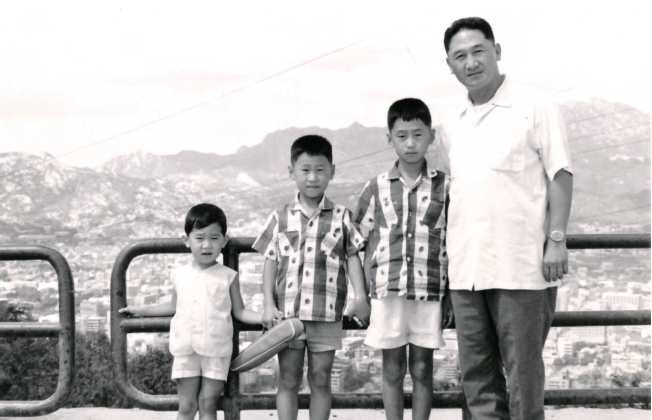
How did the sons treat their father?
The children truly followed after him in faith. They still do now. There are things they saw and learned, even when no one forced it onto them. Since saints always gathered at the house for Bible studies, the children observed and listened. Even though they weren’t sat down and taught, they knew by seeing and hearing.
Did your sons have any complaints or cause trouble?
Well, I haven’t heard any complains... How could they cause trouble in front of their father? They couldn’t do anything bad. But when they grew up and went to middle school and went through puberty, he treated them well.
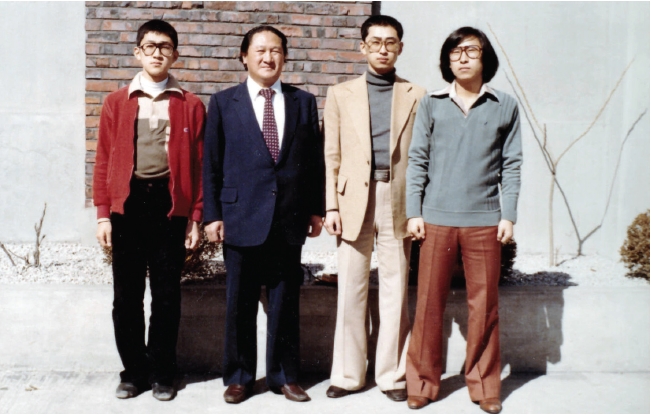
What was it like marrying off the three sons?
It was all according to the dad’s will. Of course I had to follow. It’s not like I could win, saying this and that. I followed everything he wanted to do. That’s why things are good.
(continued in the next article)
 [Interview] The love of his life was only the Bible and his s...
[Interview] The love of his life was only the Bible and his s...
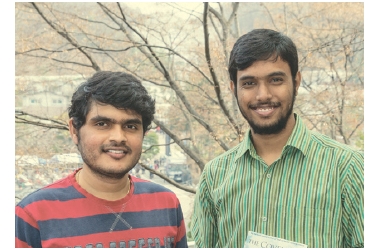 [Interview] “I realized that all the genealogies in the Bible...
[Interview] “I realized that all the genealogies in the Bible...









